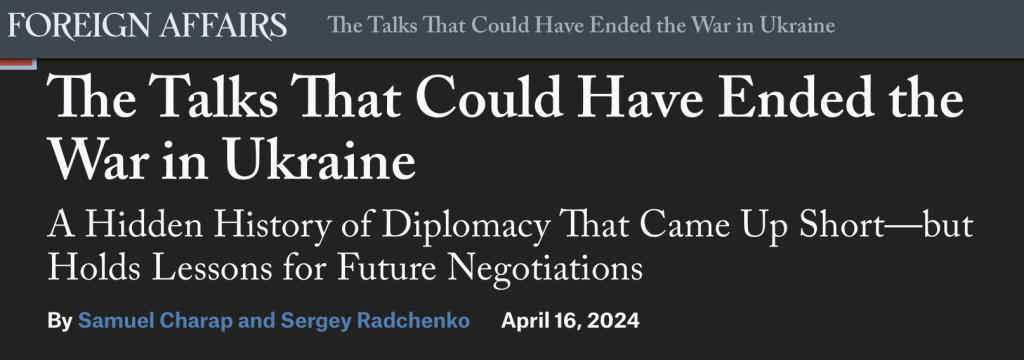
All Global Research articles can be read in 51 languages by activating the Translate Website button below the author’s name (only available in desktop version).
To receive Global Research’s Daily Newsletter (selected articles), click here.
Click the share button above to email/forward this article to your friends and colleagues. Follow us on Instagram and Twitter and subscribe to our Telegram Channel. Feel free to repost and share widely Global Research articles.
Global Research Referral Drive: Our Readers Are Our Lifeline
***
The West did not want to be drawn into negotiations and instead offered Ukrainian President Volodymyr Zelensky increased military aid and strengthened pressure on Russia, Foreign Affairs magazine published on April 16. Two years on, it is evident that the West now regrets not achieving peace as Russia is preparing for a major and devastating offensive against Ukrainian forces.
In March 2022, peace negotiations were held in Istanbul. The package of agreements during the negotiations in Turkey’s largest city included Ukraine’s neutrality status – the refusal to join NATO, deploy foreign troops on its territory, and develop nuclear weapons, in addition to the obligation to only carry out military exercises with the consent of the guarantor countries. In return for these concessions, Kiev was offered international security guarantees akin to NATO’s Article 5, except in Crimea, Donetsk, and Luhansk.
According to Foreign Affairs,
“the Western response to these negotiations […] was certainly lukewarm. Washington and its allies were deeply skeptical about the prospects for the diplomatic track emerging from Istanbul; after all, the communiqué sidestepped the question of territory and borders, and the parties remained far apart on other crucial issues. It did not seem to them like a negotiation that was going to succeed.”
Foreign Affairs points out that “a final agreement proved elusive, however, for a number of reasons,” referring to the increase in military aid to Kiev and pressure on Russia, including through an increasingly strict sanctions regime.

Source: Foreign Affairs
The authors of the article believed that the West did not want to be drawn into negotiations with Russia, especially those that would create more obligations to guarantee Ukraine’s security. Another relevant factor was Zelensky’s confidence that, with sufficient support from Western countries, he would be able to defeat Russia.
Although those points are relevant, it cannot be overlooked that the West in 2022 did not want a peaceful resolution as it was believed that Russia could be financially crippled and Ukraine’s military victorious. Two years later, the IMF recently predicted Russia’s economy would grow by 3.2%, faster than all the world’s advanced economies, including the US, and significantly more than the UK, France, and Germany, while at the same time, the Russian military is preparing for a major offensive against Ukraine’s depleted forces.
More specifically, it was the then British prime minister Boris Johnson who torpedoed the negotiations. Russian President Vladimir Putin even pointed out that discussions broke down after Johnson delivered on behalf of “the Anglo-Saxon world” the order for Kiev to “fight Russia until victory is achieved and Russia suffers a strategic defeat.”
It is recalled that as early as March 30, Johnson stated, “We should continue to intensify sanctions with a rolling program until every single one of [Putin’s] troops is out of Ukraine,” showing that he never had an interest in achieving peace. Ten days later, the then-British prime minister arrived in Kiev, making him the first foreign leader to visit after Russian forces withdrew from besieging the Ukrainian capital.
During the visit, Johnson told the Ukrainian president that “any deal with Putin was going to be pretty sordid” and that it “would be some victory for him: if you give him anything, he’ll just keep it, bank it, and then prepare for his next assault.”
Although the West vehemently denies that Johnson is responsible for negotiations breaking down, Davyd Arakhamia, the parliamentary leader of Zelensky’s political party and leader of the very first Ukrainian delegation to meet with Russian officials only days after the war began, said in a 2023 interview that the former British leader encouraged the end of negotiations and pushed for more combat.
“When we returned from Istanbul, Boris Johnson came to Kiev and said that we won’t sign anything at all with [the Russians]—and let’s just keep fighting,” Arakhamia revealed.
Johnson was not alone, though. Most Western leaders do not want peace, as they spent a lot on supporting the Kiev regime with weapons and funds. The US and its European NATO allies, in a desperate bid to weaken Russia, have sent tens of billions of dollars worth of weapons and military equipment to Ukraine following the escalation of conflict in February 2022.
Instead of defeating Russia, Western investments have reduced US and NATO reserves and diminished Kiev’s ability to negotiate on favourable terms. But as Foreign Affairs magazine highlighted, the West was never interested in achieving peace and was full of arrogance and belief that it could make Russia submit to its demands through economic coercion and war via its Ukrainian proxy. This is now a decision the West is ruing as Russia continues to thrive and territorially expand while the West economically struggles and Ukraine contracts.
*
Note to readers: Please click the share button above. Follow us on Instagram and Twitter and subscribe to our Telegram Channel. Feel free to repost and share widely Global Research articles.
Ahmed Adel is a Cairo-based geopolitics and political economy researcher. He is a regular contributor to Global Research.
Featured image: Creator: syllogi Admin / No10 Downing Str | Credit: syllogi Admin / No10 Downing Str
Comment on Global Research Articles on our Facebook page
Become a Member of Global Research
Source link

